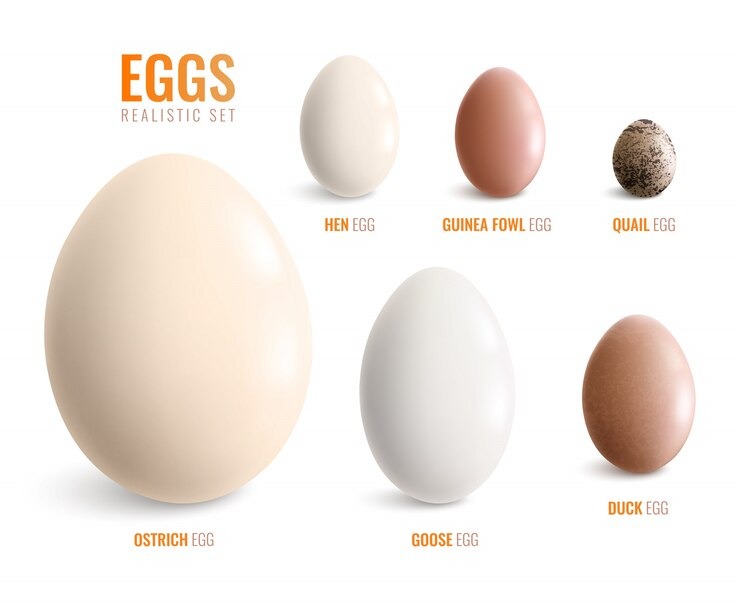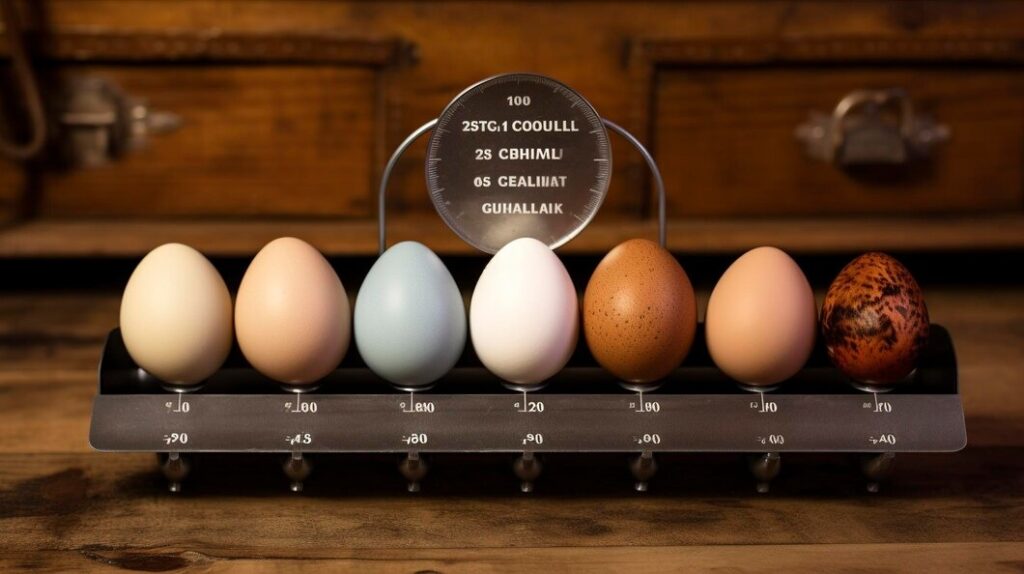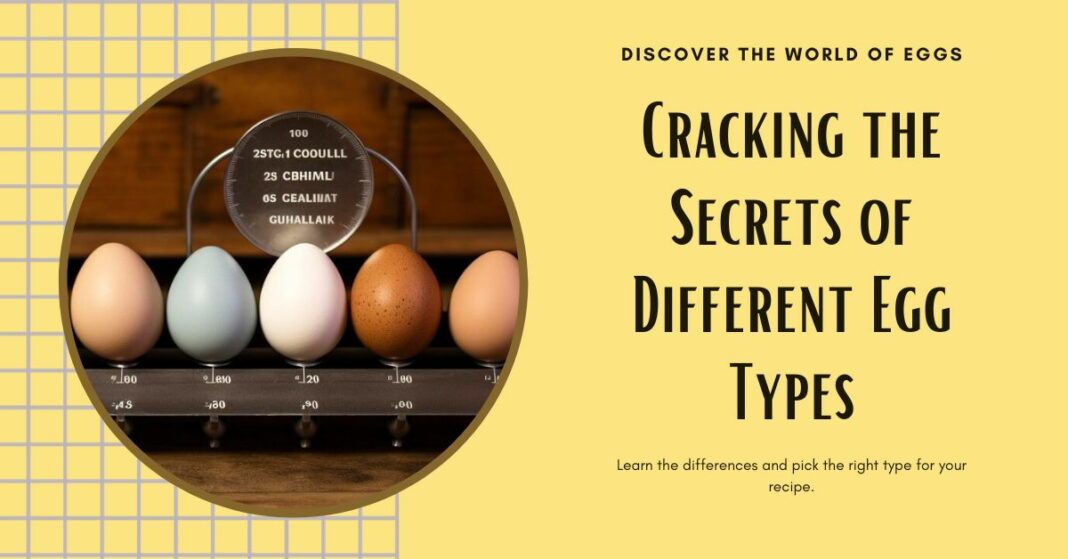Welcome to the wonderful world of eggs! No, we’re not here to give you an egg-sistential crisis. We’re here to crack open the shell and explore the diverse universe of eggs.
Have you ever wondered why your omelet might taste different when you’re cooking with eggs from your neighbor’s chickens instead of the ones from the supermarket? Well, you’re about to find out!
Eggs aren’t just round, white, and a little bit mysterious. They come in a variety of shapes, sizes, and colors. And understanding these differences can be game-changing for your culinary adventures and your well-being.
So, whether you’re an aspiring chef or just someone who loves to savor a good breakfast, this blog will be your egg-cyclopedia. We’ll guide you through the yolks and albumens (yes, that’s a fancy word for egg whites) of various egg types.
From chicken to ostrich, quail to duck, and even some eggs that will have you questioning your life choices, we’re going to explore them all. We’ll dish out quirky facts, nutritional insights, and even a few mouthwatering recipes.
Ready to unscramble the mysteries of the egg world? Then let’s dive right in!
Also Read: Acai
Common Egg Types

Now that you’re ready to dive into the egg universe, let’s start with the usual suspects, the eggs you’ll find on your breakfast table more often than not.
Chicken Eggs – The Breakfast Superstars
You’ve probably heard the saying, “You can’t make an omelet without breaking some eggs.” And most likely, those eggs are chicken eggs. They’re the MVPs of breakfast, versatile as heck, and as common as your morning coffee. Not to mention, they come in different sizes, from small to jumbo.
Flavor: Chicken eggs are known for their mild and slightly eggy flavor. Not a lot of surprises here.
Culinary Uses: Fry them, scramble them, poach them, or make them the star of your baked goods. Chicken eggs are the go-to for just about anything edible.
Nutritional Lowdown: Chicken eggs pack a protein punch, are rich in vitamins, and give you a dose of choline. But, if you’re watching your cholesterol, don’t go overboard on the yolks.
Duck Eggs – The Bigger, Bolder Cousins
Imagine chicken eggs but on steroids. That’s the duck egg for you. They’re like the overachievers of the egg world, bigger, and sometimes a bit more intense in flavor.
Flavor: Duck eggs can be a tad richer and creamier compared to chicken eggs. Think of them as the slightly eccentric relatives who add a touch of flair to your dishes.
Culinary Uses: Bakers and chefs adore duck eggs for their extra fluffiness and the magic they work in pastries. They’re also great for omelets if you like your breakfasts extra indulgent.
Nutritional Lowdown: Duck eggs are a protein powerhouse, plus they’re chock full of vitamins and minerals. Just be mindful of their larger yolk if you’re monitoring your dietary cholesterol.
Quail Eggs – The Bite-Sized Wonders
If chicken eggs are regular-sized and duck eggs are the giants, quail eggs are like the munchkins of the egg world. They’re cute, petite, and perfect for hors d’oeuvres.
Flavor: Quail eggs have a delicate, mild flavor. It’s like a tiny, refined version of a chicken egg.
Culinary Uses: These tiny wonders are perfect for garnishing salads, sushi, and hors d’oeuvres. Get creative with your presentation!
Nutritional Lowdown: Quail eggs might be small, but they’re nutritionally dense, with plenty of vitamins and minerals to offer. Plus, their small size means fewer calories.
Remember, each of these eggs brings its own charm to the table, and the choice depends on your culinary adventures and taste preferences.
Unusual Egg Types
Now that you’ve conquered the common contenders, it’s time to meet their eccentric, less-likely-to-be-invited-to-the-breakfast-table cousins. These eggs might not be everyday staples, but they sure know how to make a memorable entrance.
Ostrich Eggs – The Behemoths of the Egg World
If you thought chicken and duck eggs were big, prepare to be gobsmacked by the colossal ostrich egg. It’s like the Hagrid of eggs, a giant among dwarves.
Flavor: Ostrich eggs taste a bit like chicken eggs but milder. It’s like the gentle giant of the egg family.
Culinary Uses: Now, you might wonder how you’d cook an ostrich egg. Well, one ostrich egg is equivalent to about 24 chicken eggs! They’re a rarity on your plate but a star at large family gatherings or egg-themed potlucks.
Nutritional Lowdown: These eggs are protein-packed and lower in cholesterol compared to chicken eggs. But good luck finding them at your local grocery store.
Emu Eggs – The Green Eggs of Reality
Remember the green eggs from Dr. Seuss? Emu eggs don’t actually come out green, but they’re still pretty wild. They’re like the unexpected pop of color in a black-and-white movie.
Flavor: Emu eggs are quite similar to chicken eggs but with a richer and creamier texture. Think of them as the gourmet version of the ordinary egg.
Culinary Uses: Want an omelet that can feed a small army? Emu eggs are for you. They’re massive, so sharing is caring.
Nutritional Lowdown: Emu eggs are chock full of nutrients, from proteins to essential fatty acids. They’re like the overachievers of the egg world.
Turkey Eggs – The Unsung Heroes
Turkeys usually steal the spotlight on Thanksgiving, but their eggs deserve some recognition too. They’re not as rare as ostrich or emu eggs but are still less common than the chicken variety.
Flavor: Turkey eggs have a richer, bolder flavor compared to chicken eggs. It’s like the turkey’s way of saying, “Don’t forget about me!”
Culinary Uses: If you ever come across turkey eggs, try them out in recipes that call for chicken eggs. They can give a fresh twist to your usual dishes.
Nutritional Lowdown: These eggs are nutritious, with a higher protein content than chicken eggs. The gobble-factor is pretty high in them.
By exploring these unusual egg types, you’re opening doors to culinary adventures you probably didn’t even know existed. They might not be the usual suspects, but they sure know how to make a meal memorable.
Also Read: Paleo vs. Keto
Specialty Eggs

Alright, now it’s time to break out the golden spoons and silver platters because we’re diving headfirst into the world of specialty eggs. These eggs aren’t your everyday breakfast choice, but they sure know how to make an entrance.
Caviar – The James Bond of Eggs
Caviar, darling, is the epitome of luxury. It’s the James Bond of eggs, sophisticated and oozing class. These eggs come from sturgeon, a type of fish that’s basically the 007 of the aquatic world.
Flavor: Caviar offers an intense burst of flavors – salty, briny, and sometimes a little nutty. It’s like the fireworks display of the egg universe.
Culinary Uses: Forget the humble omelet; caviar is all about the appetizer game. You’ll find it elegantly served on blini or toast points.
Traditions: Caviar has deep-rooted cultural significance in countries like Russia, where it’s served at special occasions. So, it’s like the crown jewels of the culinary world.
Fish Roe – The Disco Ball of the Sea
Fish roe, or fish eggs, is like the disco ball of the sea. It’s all about that popping texture and a hint of oceanic flavors. These eggs come in various colors and sizes, adding a splash of vibrant energy to your dishes.
Flavor: Fish roe can vary from briny to mild, depending on the fish. It’s like a surprise party in your mouth.
Culinary Uses: Sushi lovers, you know what’s up. Fish roe is often seen as tiny, glistening orbs atop your favorite rolls.
Traditions: In Japan, the Tobiko variety (flying fish roe) is an essential part of sushi. It’s like the cherry on top of your favorite dessert.
These specialty eggs aren’t your run-of-the-mill choices, but they’re here to add a touch of extravagance and a dash of culture to your dining experience. Just remember, when you’re indulging in these eggs, it’s time to put on your fanciest monocle.
Nutritional Comparison
Time to get cracking and dissect the nutritional nitty-gritty of our egg-tastic lineup. We’ve got chicken, duck, quail, ostrich, emu, and turkey eggs all lined up for an epic showdown. So, which egg rules the roost in the nutrition department? Let’s find out!
Chicken Eggs – The All-Rounder
Protein: Chicken eggs are the poster child of protein, providing a respectable 6 grams per egg. It’s like the dependable friend who’s always there for you.
Fat: They’ve got around 5 grams of fat, mostly in the yolk. A bit of healthy fat, but not a full-blown avocado party.
Vitamins: Chicken eggs bring the vitamin A, B vitamins (like B12 and riboflavin), and a smidge of vitamin D. They’re your vitamin arsenal.
Minerals: Calcium and phosphorus are on the guest list, helping keep your bones strong.
Duck Eggs – The Bigger, Bolder Sibling
Protein: Duck eggs outmuscle chicken eggs in the protein department, offering a hearty 9 grams. It’s like the big, strong sibling.
Fat: Duck eggs are the party animals of fat, packing about 8 grams. If chicken eggs are a casual hangout, duck eggs are the late-night rave.
Vitamins: They bring vitamins A, D, and the B-team (B12, riboflavin) to the table. Not too shabby.
Minerals: Calcium, iron, and phosphorus are in the mix, upping the nutritional ante.
Quail Eggs – The Mini Marvels
Protein: Quail eggs might be tiny, but they’re mighty with around 1.5 grams of protein per egg. It’s like the pocket-sized superhero.
Fat: A quail egg has just over a gram of fat, making it the diet-conscious choice.
Vitamins: These eggs offer a concentrated burst of vitamins A and B12. They’re the shot of espresso in your vitamins lineup.
Minerals: Quail eggs deliver iron and zinc. They’re the real deal, just in miniature form.
Ostrich and Emu Eggs – The Nutritional Giants
Protein: Ostrich eggs are the heavyweight champs with a whopping 13 grams of protein. Emu eggs aren’t far behind, hitting around 9 grams.
Fat: Ostrich eggs are quite lean with approximately 5 grams of fat, while emu eggs boast about 6 grams. They’re the lean, mean protein machines.
Vitamins: Both offer an abundance of vitamins, including A, D, B vitamins, and a touch of vitamin E. They’re the full-package deal.
Minerals: Iron, phosphorus, and potassium are part of the nutritional parade. These eggs bring a whole mineral garden.
Turkey Eggs – The Understated Gems
Protein: Turkey eggs offer a solid 5 grams of protein. They’re like the quiet achievers at a party.
Fat: With around 4 grams of fat, they’re in the middle ground – not too extravagant, not too humble.
Vitamins: You’ll find vitamin D and the B family (especially B12) in these eggs. They’re the humble heroes.
Minerals: Turkey eggs bring in iron, potassium, and selenium, offering a variety of health benefits.
Choose Your Eggs Wisely
Now, with this egg-ucational journey, you can choose your eggs like a seasoned pro. Go for chicken eggs if you want the all-rounder. Opt for duck eggs if you’re craving something richer. Grab quail eggs for a bite-sized vitamin boost.
Embrace ostrich or emu eggs for a nutritional grand slam. And don’t forget the understated gems, turkey eggs, for a balanced option. Remember, there’s an egg for every occasion, and it’s your call!
Cooking with Various Egg Types
Now that you’re a bona fide egg aficionado, let’s dive into the exciting realm of cooking. Whether you’re a culinary genius or struggle to boil water without setting off the smoke alarm, there’s an egg dish for everyone. Buckle up and get ready to impress your taste buds.
Chicken Eggs – The Classic Crowd-Pleasers
Scrambled Sensation: Whip up a fluffy batch of scrambled eggs – the breakfast champion. Add cheese, herbs, or leftovers from your fridge for an egg-squisite masterpiece.
Devilishly Good Deviled Eggs: Elevate your picnic game with deviled eggs. Mix the yolks with mayo, mustard, and some zingy paprika for a flavor explosion.
Duck Eggs – Big and Bold
Duck Egg Omelet: Make a hearty omelet using duck eggs. Fill it with sautéed veggies, cheese, or even a touch of truffle oil. It’s like a culinary adventure.
Duck Egg Custard*: Create a silky custard for dessert. Creamy, dreamy, and utterly irresistible.
Quail Eggs – Tiny, Tasty Treats
Quail Egg Salad: Add these mini marvels to a salad for a dainty and delightful crunch.
Quail Egg Canapés: Impress your guests with these posh little bites. Top crackers with quail eggs and caviar if you’re feeling fancy.
Ostrich and Emu Eggs – Giant Feasts
Ostrich Egg Frittata: Host a brunch for the whole neighborhood with a massive ostrich egg frittata. It’s the definition of ‘go big or go home.’
Emu Egg Omelet: Dare to try the emu egg omelet, seasoned with exotic spices for an unforgettable taste journey.
Turkey Eggs – The Unsung Heroes
Turkey Egg Curry: Whip up a flavorful curry with these subtle wonders. They might be understated, but they’re culinary game-changers.
Turkey Egg Benedict: Give the classic Eggs Benedict a twist by using turkey eggs. They’re a quieter but equally delicious star.
Cooking Tip: Remember, when using larger or smaller eggs than a recipe calls for, you may need to adjust quantities and cooking times. But don’t worry; it’s all part of the egg-citement in the kitchen.
Eggs Across Cultures: Eggs have found their way into the heart of cuisines worldwide. From the fluffy Japanese Tamago Sushi to the rich French Quiche Lorraine, there’s an egg dish for every palate.
So, whether you’re flipping an omelet or crafting a masterpiece, each egg type brings its unique charm to the kitchen. Get ready to crack a few eggs and conquer the culinary world!
Also Read: Short Workouts
Ethical Considerations
Alright, folks, time to get a bit serious here. We know eggs are delicious and all, but there’s a moral egg-sistence to ponder too.
- Chicken Eggs – The Ethical Dilemma: Now, we’re not saying chickens are philosophers, but their living conditions matter. Opt for eggs from free-range, pasture-raised, or backyard chickens. Happy hens lay the best eggs.
- Duck and Quail Eggs – Honorable Mentions: Ducks and quails have feelings too. Check for eggs from sources that prioritize humane treatment and ethical practices. It’s your little contribution to the quack-tastic and quail-ity world.
- Ostrich, Emu, and Turkey Eggs – Respect the Unusual: These big birds have bigger needs. Seek eggs from farms that give these flightless wonders the space and care they deserve.
- Egg Labels – The Secret Decoder: Not all labels are created equal. ‘Organic’ and ‘Certified Humane’ usually mean better living conditions for our feathery friends. As for ‘cage-free,’ well, it’s a start, but it’s like calling your walk-in closet a studio apartment.
- Eco-Conscious Choices – Eggs and the Planet: Mindful consumption is all the rage. Eggs from farms that use eco-friendly practices make sure you’re not scrambling the planet while you cook.
- Get Eggucated: Now that you’ve got the scoop on the ethical side of eggs, it’s your turn to make egg-ceptional choices. Your taste buds and the world thank you.
Remember, folks, eggs come from all walks of life – chickens, ducks, quails, and more. And while they’re here to make our meals marvelous, it’s our job to make sure they’re living their best egg-sistence.
In Crux
Alright, it’s time to wrap up our egg-citing journey through the incredible egg universe. We’ve cracked open a world of flavors, sizes, and textures, and it’s been egg-ceptional. Here are some takeaways that might have your brain sunny side up:
Egg-plore, Don’t Settle: Sure, chicken eggs are fantastic, but don’t be afraid to shake things up. Give duck, quail, or even emu eggs a go. You might just discover a new egg-ssential favorite.
Egg-tastic Nutrition: Different eggs offer different nutrients. Think about what your body needs, and choose accordingly. After all, variety is the spice of egg-citing meals.
Get Ethical: Think about the hens and ducks that provide your breakfast. Ethical and sustainable choices not only taste better but also feel better on your conscience.
Egg-spand Your Menu: If you’ve been sticking to omelets, it’s time to branch out. Try making some caviar-topped deviled quail eggs or ostrich egg frittatas. Who knows what eggy delights you’ll discover?
Crack a Few Eggs: The world of eggs is your oyster, or should we say your eggster? So go on, get crackin’ in your kitchen, and whip up some egg-squisite meals. Scramble, fry, or poach your way to culinary heaven.
Questions? Comments? Eggcitement?: We love to hear from you. If you have any egg-centric thoughts or queries, don’t be shy. Drop us a line, and let’s keep the egg-sploration going.
So there you have it, folks. The egg-spansive world of egg varieties awaits your exploration. Whether you’re whipping up a fancy brunch or just looking to elevate your egg game, there’s an egg for every occasion. Have an egg-straordinary culinary adventure!
Thank you for joining us on this fitness journey! We hope you found our blog insightful and inspiring. Our aim is to provide you with valuable information, expert advice, and motivational content to support you in your wellness endeavors.
Related Post :-
- 1-The Secret to Digestive Wellness: Almond Snacking
- The Almond Benefits: 10 Reasons to Include Them
- The Art of Soaking Almonds: How It Impacts Your Wellness
- Power of Consistence
- Nutritional Gems: A Guide to 10 Healthy Nuts
FAQs about Egg Types
Which egg is the healthiest?
Chicken eggs are a popular choice for their well-balanced nutritional profile, but other eggs like quail and duck eggs offer unique benefits. The healthiest egg depends on your dietary needs and preferences.
Can you eat ostrich eggs?
Yes, you can eat ostrich eggs. They are a delicacy, known for their large size and rich flavor. Just one ostrich egg can be equivalent to about 24 chicken eggs.
Are caviar and fish roe the same thing?
No, they're not the same. Caviar typically refers to the salted eggs of sturgeon fish, while fish roe includes the eggs of various fish species. Caviar is considered more upscale and expensive.
Do all eggs taste the same?
No, different eggs have distinct flavors. For example, duck eggs are richer and creamier, while quail eggs have a milder taste. The taste can vary based on the bird's diet and how they're prepared.
How do I choose the best eggs for a specific dish?
Choose eggs based on your recipe. If you need a mild flavor, quail eggs might be your pick. For richer recipes, like custards, duck eggs could be perfect. It's all about complementing your dish.
Are there any vegetarian options for eggs?
Vegetarian eggs, like tofu or chickpea flour scrambles, can be great alternatives. They're cruelty-free and fit for vegetarian diets.
What's the difference between white and brown eggs?
The color of the eggshell is determined by the chicken's breed, not its nutritional value. There's no significant nutritional difference between the two.
Are egg-eating habits ethical and sustainable?
The ethical and sustainability aspect varies based on farming practices. Organic, free-range, and cage-free options are generally more ethical and environmentally friendly.
Can you eat raw eggs?
While some dishes use raw eggs, like in mayonnaise or certain cocktails, consuming them carries a slight risk of foodborne illnesses. Be cautious and use pasteurized eggs when needed.

Meet Pradeep Singh, your go-to guide for all things fitness, health, and motivation. With over 7 years in the field, Pradeep brings a blend of expertise and real-world experience to his writing. From workout tips to healthy living insights, he simplifies complex topics, making fitness accessible for everyone. His authentic approach and genuine passion aim to inspire and support your wellness journey. Get ready to embark on a path to a healthier lifestyle with Pradeep as your trusted companion and motivator.






















